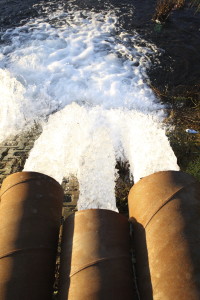In an era conscious of water scarcity, the water-energy nexus made the agenda of the Senate Energy and Natural Resources Committee, which is considering broad based, bi-partisan legislation, the “Energy Policy Modernization Act of 2015.” The nexus between water and energy refers generally to the fact that the provision of water and wastewater services tends to be highly energy intensive, while most types of power generation tend to be highly water intensive.
 A provision in the bill that has received surprisingly little attention in the industry press would require the Department of Energy to establish a “smart energy and water efficiency pilot program” that would award grants to a limited number of utilities, municipalities, water districts, Indian tribes and Alaska Native villages, and other authorities that provide water, wastewater, or water reuse services. The grants would fund pilot projects that “demonstrate unique, advanced, or innovative technology-based solutions” to the so-called water/energy nexus -- the policy challenge posed by fact that conventional energy production tends to be highly water consumptive, while the provision of water-related services tends to require large amounts of energy.
A provision in the bill that has received surprisingly little attention in the industry press would require the Department of Energy to establish a “smart energy and water efficiency pilot program” that would award grants to a limited number of utilities, municipalities, water districts, Indian tribes and Alaska Native villages, and other authorities that provide water, wastewater, or water reuse services. The grants would fund pilot projects that “demonstrate unique, advanced, or innovative technology-based solutions” to the so-called water/energy nexus -- the policy challenge posed by fact that conventional energy production tends to be highly water consumptive, while the provision of water-related services tends to require large amounts of energy.
Although the eligibility language of the bill is somewhat imprecise, it appears that the grants would be limited to technologies that (1) increase the energy efficiency of water, wastewater and water reuse systems; (2) otherwise improve such systems to help communities make measurable progress in conserving water, saving energy, and reducing costs; (3) support the implementation of innovative and unique processes and the installation of established advanced automated systems that provide real-time data on energy and water; or (4) improve energy-water conservation and quality and predictive maintenance through technologies that utilize internet connected technologies, including sensors, intelligent gateways, and security embedded in hardware.
Grants would be awarded based on: (1) energy and cost savings; (2) the uniqueness, commercial viability, and reliability of the technology; (3) the degree to which the project integrates next-generation sensors software, analytics, and management tools; (4) the anticipated cost-effectiveness of the pilot project through measurable energy efficiency savings, water savings or reuse, and infrastructure costs averted; (5) whether the technology can be deployed in a variety of geographic regions and in a wide range of applications; (6) whether the technology has been successfully deployed elsewhere; (7) whether the technology was sourced from a manufacturer based in the United States; and (8) whether the project will be completed in 5 years or less.
The bill would authorize the appropriation of $15,000,000 to fund the program. Grant recipients would be selected not later than 300 days of enactment of the legislation.
The Energy Finance Report is closely monitoring the progress of the Energy Policy Modernization Act of 2015, which has so far been quiet on renewable energy generally. As waste heat, particularly in water based heating systems, is anticipated to be next big horizon for energy efficiency, the Senate Finance Committee’s grant may be a step in the right direction for the water/energy efficiency industry.


.jpg?width=220&name=Sullivan%204c(B2402503).jpg)